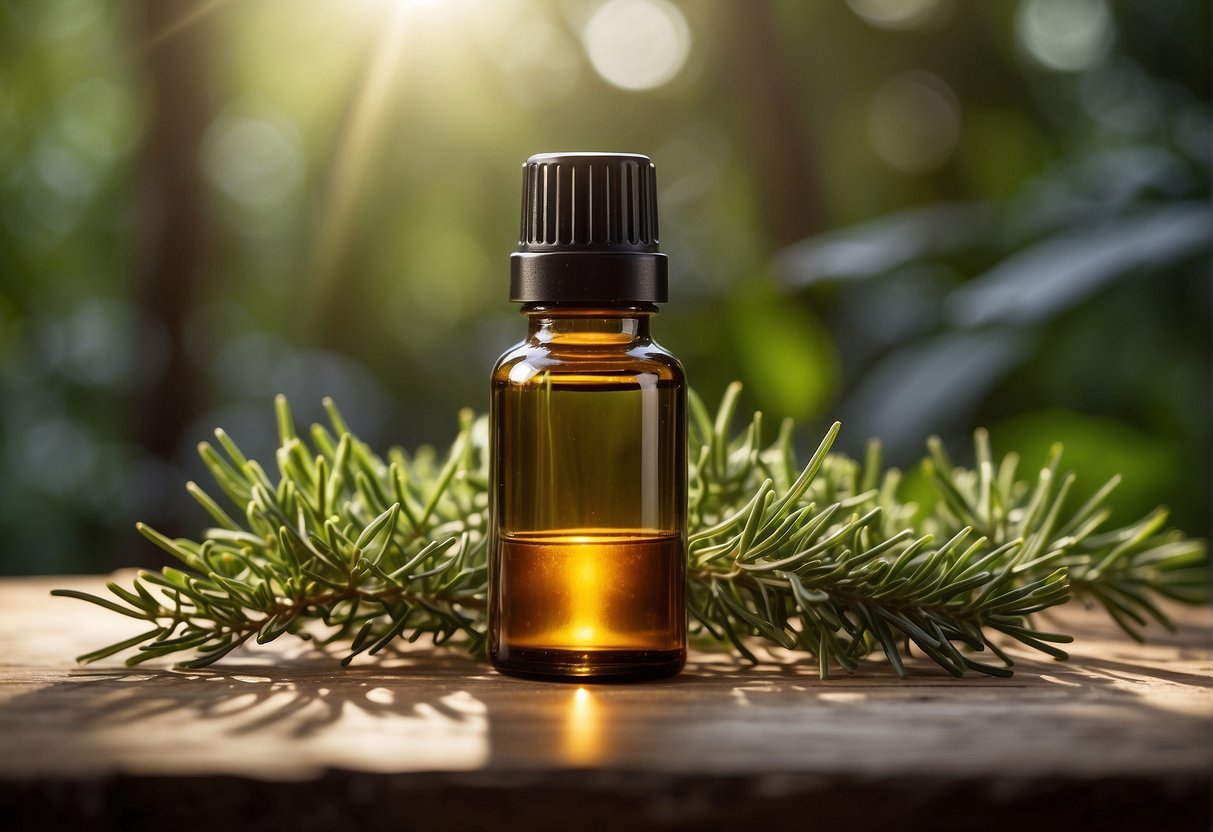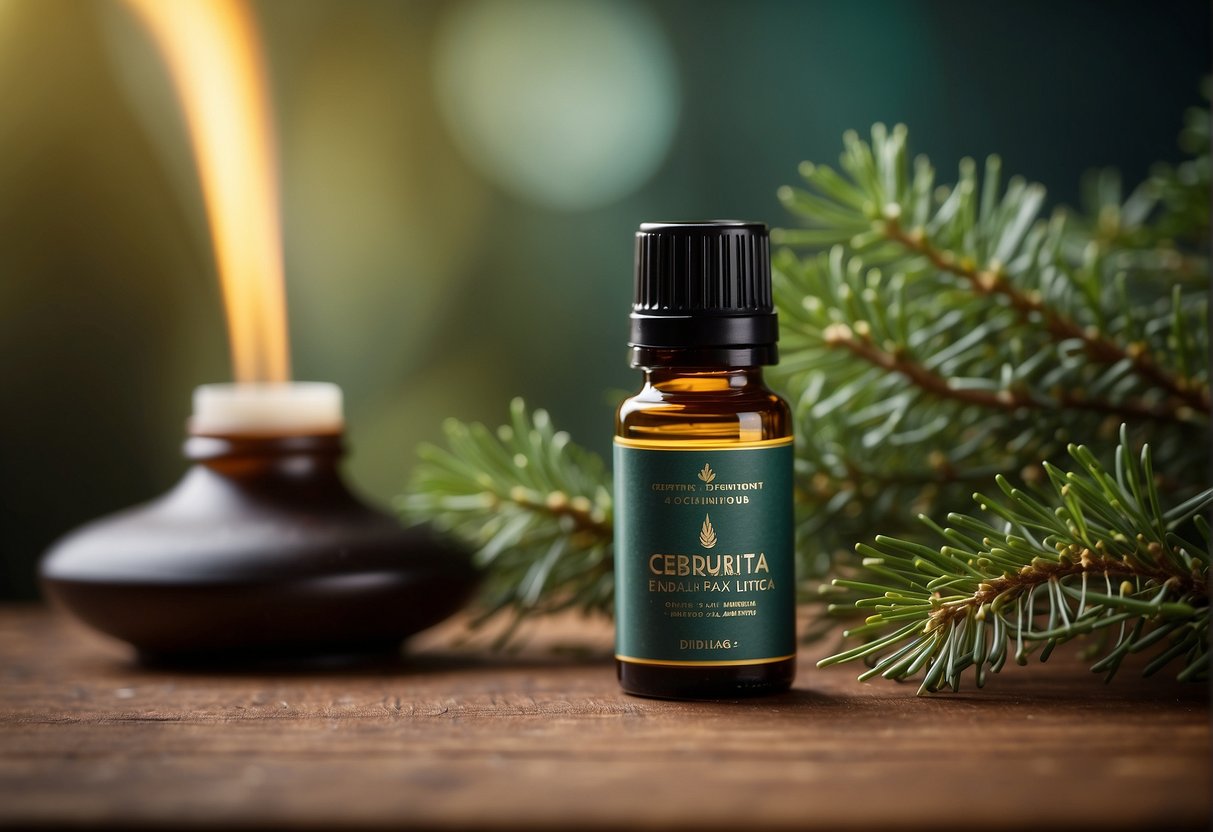Cedrus Atlantica Essential Oil Benefits: Exploring Therapeutic Potentials
Cedrus Atlantica Essential Oil Benefits: Exploring Therapeutic Potentials
Cedrus atlantica, commonly known as Atlantic cedar, harbors a wealth of beneficial properties in its essential oil. Derived from the wood of this majestic tree, the essential oil is celebrated for its antioxidant, antimicrobial, and anti-inflammatory capabilities. Its rich composition, dominated by compounds like alpha-pinene, equips it for a variety of therapeutic uses, from fostering skin health to potentially offering protective effects against certain types of cell damage.

Distillation of Cedrus atlantica wood yields an essential oil with a storied tradition of use in various cultures for its health-supporting qualities. Not only is it used in aromatherapy and alternative medicine, but it also possesses traits that make it beneficial for hair and skin care. Harnessing these properties, the essential oil serves as a versatile component for personal wellness, proving effective against certain pathogens and in treating different conditions when appropriately applied.
Utilized conscientiously, Cedrus atlantica essential oil emerges as a natural resource with a minimal environmental footprint, aligning with eco-friendly practices. It's important to navigate the use of this potent oil with an understanding of safety guidelines and potential interactions. When blended with complementary oils, it can enhance its potency and broaden its scope of beneficial applications, underscoring its revered status in natural health and wellbeing.
Key Takeaways
- Cedrus atlantica essential oil is valued for its therapeutic properties, including antioxidant and antimicrobial effects.
- The oil can benefit skin and hair care when used appropriately, acknowledging safety guidelines.
- It has a place in eco-conscious practices, with potential for blending with other oils for enhanced benefits.
Historical and Botanical Profile of Cedrus Atlantica

Cedrus Atlantica, also known as Atlas Cedar, possesses a rich heritage and distinct botanical characteristics. Let us explore its historical significance and botanical properties.
Cedrus Atlantica: A Botanical Overview
Cedrus Atlantica is a coniferous tree from the Pinaceae family, native to the Atlas Mountains of Morocco and Algeria. With a majestic stature, the Atlas Cedar can reach up to 30-35 meters in height and up to two meters in diameter. It is not to be confused with red cedar, as the two are distinct species.
The cedar tree has needle-like leaves arranged in spirals and produces barrel-shaped cones. Its wood is known for being hard, dense, and durable, with a fine grain that is highly valued in woodworking. Cedrus Atlantica is currently listed as an endangered species, facing threats from over-exploitation and habitat loss.
Historical Significance of Cedarwood
Historically, cedarwood has been revered for millennia, notably by the ancient Egyptians who utilized it in construction, shipbuilding, and for making sarcophagi. The wood's aromatic oils have been prized for their preservative qualities, well-suited for safeguarding artifacts against decay. Cedarwood from trees like Cedrus Atlantica has also been mentioned in various historical texts for its use in traditional medicine and spiritual practices.
Therapeutic Properties and Benefits

Cedrus atlantica essential oil, commonly known as cedarwood essential oil, is extracted from the wood of the Cedrus atlantica tree. This oil has attracted considerable attention due to its broad range of therapeutic properties, particularly its antimicrobial, anti-inflammatory, and sedative effects, which contribute to its various health benefits.
Antibacterial and Antifungal Qualities
Cedarwood essential oil is recognized for its antimicrobial and antifungal properties. Researchers have documented its effectiveness in combating bacterial strains and fungal pathogens, offering a natural alternative for enhancing the sterility of environments and preventing infections.
Anti-Inflammatory and Pain-Relief Uses
The anti-inflammatory capabilities of Cedrus atlantica essential oil have been thoroughly studied. It is shown to exert significant pain-relief effects, akin to conventional pain medications, which bears medicinal implications for treating conditions associated with inflammation.
Aromatic Benefits: Stress Relief and Aromatherapy
In aromatherapy, the inhalation of cedarwood essential oil can lead to substantial stress relief and calming sensations. Its sedative properties have been observed to play a role in the alleviation of stress and anxiety, positioning it as a valuable addition to integrative health practices focused on mental well-being.
Cedrus Atlantica Essential Oil in Skin and Hair Care

Cedrus Atlantica, or cedarwood oil, offers several benefits for both skin and hair care. Its properties are utilized in various hair care formulations and acne treatment products.
Combatting Scalp Conditions and Promoting Hair Growth
Cedarwood oil is known for its soothing effect on the scalp. It helps reduce irritation and dandruff, which are common scalp conditions. We incorporate the oil into shampoos and conditioners, enhancing their effectiveness.
Regular use can stimulate the follicles, contributing to hair growth. Our hair care products containing cedarwood oil are designed to strengthen hair and improve scalp health.
Acne Treatment and Skin Care
We utilize cedarwood oil's antiseptic and anti-inflammatory properties for acne treatment. It's a natural remedy to help reduce acne outbreaks. Our skincare lines with cedarwood oil aim to soothe and clarify complexion without harsh chemicals.
For daily use, it can help maintain the balance of skin oil production. This balance is essential for a clear, healthy-looking skin. Our acne care products are formulated to leverage these benefits for maximum efficacy.
Practical Applications and Safety Guidelines

Cedrus atlantica essential oil is prized for its antimicrobial, anti-inflammatory, and antioxidative properties. When used responsibly, it can be a valuable addition to personal care and wellness routines.
Cedrus Atlantica Oil in Everyday Life
Cedrus atlantica essential oil has a variety of everyday uses due to its pleasing scent and therapeutic properties. Aromatherapy is a popular method; adding a few drops to diffusers can purify the air and provide a calming atmosphere. When diluted with a carrier oil, it can also be used for massage to relieve muscle tension. Moreover, adding a small amount to pillow or sheets before bedtime may promote a restful sleep.
Dilution, Application, and Safety Precautions
Safety is paramount when it comes to using essential oils. Cedrus atlantica oil must be diluted with a carrier oil before application to the skin to prevent irritation. A typical dilution ratio is 1-2%, equating to approximately 1-2 drops of essential oil per teaspoon of carrier oil. When adding to bath water, ensure it's emulsified beforehand to avoid oil droplets that can irritate sensitive areas.
- Caution: Always perform a patch test on a small skin area to check for any adverse reactions.
- Children: Essential oils should be used with extra caution around young children and always kept out of their reach.
- Cedrol, a compound found in Cedrus atlantica essential oil, may contribute to its effects but should be considered in the context of individual safety and potential allergenic reactions.
Complementary Blends and Uses

When incorporating Cedrus atlantica, also known as Atlas cedarwood, into aromatherapy practices, its synergistic potential with other essential oils is particularly noteworthy. This can result in blends that target specific therapeutic outcomes.
Cedrus Atlantica in Synergy with Other Oils
Cedrus atlantica oil is rich in himachalol and sesquiterpenes, compounds known for their grounding and calming properties. To elevate these effects, we often blend it with lavender or Himalayan cedarwood oils which share similar constituents. Atlas cedarwood also complements juniperus virginiana and virginian cedarwood effectively.
For a blend aiming to uplift the spirit, we commonly marry Cedrus atlantica with citrus notes. Lemon and bergamot offer refreshing and mood-enhancing properties that align well with the Atlas cedarwood's base notes. Additionally, for a more complex aroma profile, infusing frankincense or sandalwood can add a warm, sweet depth.
In creating a robust and invigorating blend, we include rose and cinnamon essential oils. These add a spicy floral hint that contrasts and balances the earthy tones of Cedrus atlantica, resulting in a harmoniously stimulating mixture.
To develop a forest-like ambiance, we blend Atlas cedarwood with pine, cypress, and juniperus ashei oils. This combination is popular for replicating the serenity of a woodland environment in aromatherapy sessions. The use of such oils can provide a complementary effect on the respiratory system and enhance the overall sensory experience.
Cedrus Atlantica Oil: Environmental Impact

Our focus here is on the environmental implications of the use of Cedrus Atlantica Oil, particularly its extraction and use, and the importance of sustainable practices to mitigate any negative impacts.
Conservation Status and Sustainable Harvesting
Cedrus Atlantica, also known as Atlas cedarwood, is a coniferous tree native to the Atlas Mountains of Morocco and Algeria. It's not only renowned for its robust wood but also for its essential oil, commonly obtained through steam distillation. The oil is sought after for its aromatic properties and its use in medicine, where it is believed to have benefits for conditions such as arthritis and potentially cancer, owing to its soothing properties.
When discussing the environmental impact of Cedrus Atlantica oil, it is imperative to address the tree's conservation status. Currently, Atlas cedarwood is not listed as endangered, but it is vital to ensure that harvesting methods do not threaten its sustainability. Overharvesting can lead to a decline in tree populations, which in turn impacts ecosystems relying on these trees. Sustainable harvesting practices include controlling the number of trees cut down and ensuring that new trees are planted.
In our extraction processes, we must consider alternatives to chemicals that can harm the environment. Unlike some pesticides that the EPA regulates due to their potential impact on blood pressure, the heart, and the environment at large, Atlas cedarwood essential oil has been studied for its antimicrobial properties that offer a more environmentally harmonious alternative for protecting cedar wood from fungi without harsh chemicals.
Harvesting essential oils requires responsible sourcing to preserve the ecological balance. This extends to closely related species such as Texas cedarwood, Virginia cedarwood, and Lawson's cypress, known scientifically as Chamaecyparis lawsoniana. Maintaining biodiversity is crucial, and, therefore, sustainable harvesting of Cedrus Atlantica is our commitment.
Frequently Asked Questions

Cedarwood essential oil, derived from the Cedrus atlantica tree, is renowned for its versatile uses in personal care and holistic well-being. We've compiled a list of frequently asked questions to help you understand its benefits more deeply.
What are the recognized benefits of using Cedarwood essential oil for hair care?
We recognize Cedarwood essential oil for promoting scalp health, reducing dandruff, and contributing to hair growth. Its use can lead to stronger hair follicles and a healthier scalp when used consistently.
Can Cedarwood essential oil be effectively used in pest control, and if so, how?
Certainly, Cedarwood essential oil is a natural and effective pest deterrent. It can be used by placing a few drops in diffusers or mixing with water to spray affected areas, deterring moths, mosquitoes, and other insects.
What are the main advantages of incorporating Cedarwood essential oil in aromatherapy?
Incorporating Cedarwood essential oil in aromatherapy is known to have a calming effect on the mind. It can aid in alleviating stress and promoting restful sleep due to its sedative properties and pleasant, grounding aroma.
How does Cedarwood essential oil complement other essential oils in blends?
Cedarwood essential oil has a woody, warm base note that blends well with many essential oils, enhancing their fragrance and therapeutic properties. We find it pairs particularly well with oils like lavender, rosemary, and bergamot for a synergistic effect.
What are the unique properties of Cedarwood essential oil that benefit the skin?
Cedarwood essential oil has astringent properties and may assist in reducing the appearance of skin imperfections. It helps in balancing oil production and improving skin tone with its regular application diluted in a carrier oil.
In what ways do people use Atlas Cedarwood essential oil for spiritual practices?
People often use Atlas Cedarwood essential oil for grounding and clarifying the mind during spiritual practices. We note that its warm, woody scent is believed to enhance concentration and create a calming atmosphere for meditation and prayer.